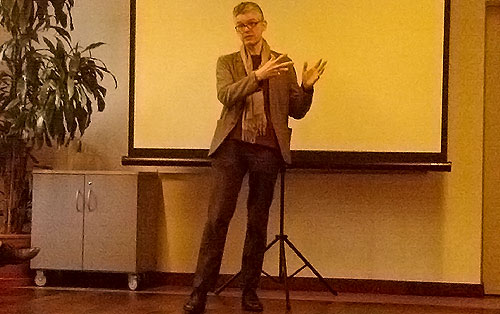A few weeks ago, Chris Taggart from OpenlyLocal in the UK gave an interesting presentation. He was attending an event in Berlin: ePSI platform: Open Data: Apps for Everyone? Taggart aka @countculture spoke about how the hyperlocal site came into being in 2009, originally planned as a datajournalism project. In the end he gives a kind of utopian notion about how a data driven democracy could look like. He is going to present in Berlin again in April at the re:publica 11. Find his blog here.
[display_podcast]
This is a partial transcript:
„I had no desire to spend my hours with programming and messing around with data. Actually I wanted to do some data journalism. And I thought lots of people are looking at government data – let me look at local government data. […] It was supposed just to be a tiny little project. It started off with twelve councils, trying to scrape of their websites. The basic stuff: Who the councilors are, which comittees they sit on. What were the meetings of these comittees. I wasn‘t even going to do a website at first. It just going to be data. Maybe just an API with one page describing how to use it. Then I thought maybe I put a few pages up there. […]
„We have now a hyperlocal directory of websites which is avaiable as data, which got about 450 hyperlocal site on there; you can do queries – you can say: ok, tell me those closest to this and such stuff. We he have 160 something councils who we pulling the data off. Over 10.000 councilors. We have the comittees, their membership; to a degree, what the history of the membership is, when those meetings are, the minutes of this meetings in many case.
„Then someone said that, it would really nice to get some statistics about it. So we pulled in the national statistics and broke it down into areas. So you can see what the demographics are and so on. Then I came across that file about spending, the local government department had done. And it was just an Excel-file that was published and no one really looked at. It was a locked Excel-file. So I opened it up in OpenOffice and converted it into data and suddenly: For the first time people would see what is being spend in their area.
„So it just grown and grown and grown. […]
„Despite the fact that I didn‘t want to do this. Despite the fact, that I have written this huge amount of code which got us a massive amount of data: We are about 5 percent where we should be.
„I want to walk down the street, my local street, and I want my app, I want a piece of paper that someone puts to my door that is being driven by an app, if I am not properly connected. I want someway to know this street is going to be closed next week because of this. I want to know my way to work is going to be changed. I want to know that building over there which I really hate – then I hold up my smartphone and look at it and say: Who approved that building, on what date. And I want to see what the minutes of that meeting were. I want to know the members of the panel that approved that and what their majorities were and when they are next up for reelections.
[…]
„Open Data for me – Open Data is not about most of what we heard this morning which had to do with businessmodels and things like that. Open Data is about democracy. Democracy is two different people hearing the same speech, reading the same leaflets and coming to different decisions. For me Open Data is Data Democracy. Being able to see the same data, looking at it in different ways and coming to different conclusions around it.“ […]

Don’t think (or at least hope) it wasn’t Utopian 😉 One of the key points I always try to make is that live is messy, ambiguous and full of failure, and that if we try to come up with Utopian solutions that fail to recognize that, we’ll fail. Open data is about democracy, but it’s not going to solve all our problems, or make the sun shine every day.